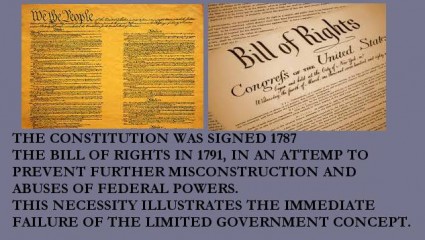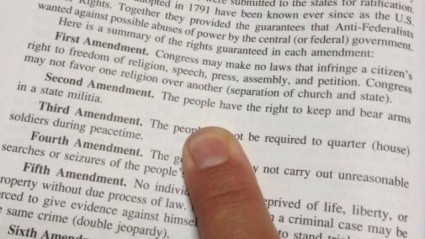April 28, 2013
By: Kelly Diamond, Publisher

There are several modifications and augmentations this document has undergone which makes me wonder: just how much of the original document is left?
I also plan to address the modifications that weren’t made via any official methods, but for now, let’s just take a look at the “official” changes made to this “living, breathing” document. Below is a chart where I track all the times the constitution has been modified or superseded in some way. It’s rather tangled. And from what I’ve noticed, there’s a lot going on in there that has powerful people voting on their powers to retain and grow their powers. When plotted out this way, how does it look to you… other than contradictory and self-defeating?
Amendment 11: “Judicial Limits”
Passed: 3/4/1794 Ratified: 2/7/1795
This amendment modifies Article 3, Section 2. One of the interpretations makes rather clear that the states are NOT the sovereign nation states they were originally intended to be. The state has power over the individual… but is always subject to the federal government.
Amendment 12: “Choosing the President & Vice President”
Passed: 12/9/1803 Ratified: 6/15/1804
This amendment supersedes Article 2, Section 1. This was the introduction of the Electoral College. Prior to this amendment there was no distinction between a presidential and vice presidential candidate NOR a distinction of political bent (i.e. party), and it was up to the State Legislature to vote for the President. Rather than simply creating that distinction so that people like Thomas Jefferson and John Adams didn’t wind up running mates in the end, they created an electoral college.
Amendment 13: Slavery Abolished
Passed 1/31/1865 Ratified: 12/6/1865
This amendment supersedes Article 4, Section 2. This abolishes slavery or involuntary servitude, or more technically changes “emancipation” to “abolition”. I will clarify here that this is only with respect to private citizens. It’s perfectly acceptable that we be indentured to the state or government. And the state can indenture one person to another through a court order as well. That’s TOTALLY different. *sarcasm*
But let’s be very clear: the Civil War had NOTHING to do with freeing slaves, and Lincoln was nothing more than a hegemon.
“The Civil War raged from 1861 to 1865. In the early stages, Lincoln didn’t allow his generals to free slaves in captured territories, and he even reversed their emancipation proclamations. For example, when General John Frémont freed all slaves in Missouri, Lincoln canceled the general’s proclamation and relieved him of his command.” (Source: Dummies.com)
Amendment 14: Citizenship Rights
Passed: 6/13/1866 Ratified: 7/9/1869
This modifies Article 1, Section 2. Basically, it muddies the waters regarding whether to apportion representation by counting only legal citizens tallied by the census or not.
Amendment 16: Status of Income Tax “Clarified”
Passed: 7/2/1909 Ratified: 2/3/1913
This modifies Article 1, Section 9. And a warm welcome to the Income Tax!
Original Article 1, Section 9: “No capitation, or other direct, Tax shall be laid, unless in Proportion to the Census or Enumeration herein before directed to be taken.”
16th Amendment: “The Congress shall have power to lay and collect taxes on incomes, from whatever source derived, without apportionment among the several States, and without regard to any census or enumeration.”
I think my favorite part is how the 16th Amendment is considered a “clarification” of Article 1, Section 9. I read it as a total unraveling of Article 1, Section 9. But po-tay-toh, po-tah-toh!
Amendment 17: Senators Elected by Popular Vote
Passed: 5/13/1912 Ratified: 4/8/1913
This modifies Article 1, Section 3. Senators are now elected by popular vote rather than by the state legislature.
Article 1, Section 3 reads: “The Senate of the United States shall be composed of two Senators from each State, chosen by the Legislature thereof, for six Years; and each Senator shall have one Vote.”
“The Senate of the United States shall be composed of two Senators from each State, elected by the people thereof, for six years; and each Senator shall have one vote.”
There goes the accountability of the Senate AND the state legislature. It used to be that the state legislature was elected by popular vote, and they were held to account for the Senatorial seats. They would put direct pressure on Senators to do as their constituents wanted. Now, with two senators allocated to an entire state population, the Senators aren’t accountable for anything.
Amendment 18: Liquor Abolished
Passed: 12/18/1917 Ratified: 1/16/1919
Here’s where prohibition becomes Constitutional! And check out the quick turn-around from passed to ratified! Everything else took at least 6 months if not longer to get ratified… but this one, had a rush put on it!
This is later undone by Amendment 21.
Amendment 20: Presidential and Congressional Terms
Passed: 3/2/1932 Ratified: 1/23/1933
This amendment modifies Article 1, Section 4. Basically, the dates for convening for Congress and the President moved to January, thus abbreviating the lame-duck session.
Amendment 21: Amendment 18 Repealed
Passed: 2/20/1933 Ratified: 12/5/1933
This amendment undoes Amendment 18. You’ll notice it took considerably longer to ratify this one than its counterpart. You’ll likewise notice that due to the failure of the 18th amendment, congress no longer bothers to push prohibition laws through Constitutional amendments, as evidenced by our current Drug War.
Amendment 25: Presidential Disability and Succession
Passed: 7/6/1965 Ratified: 2/10/1967
This amendment modifies Article 2, Section 1. Rather than allowing congress to decide who is next in command, even temporarily, or holding another election, as was suggested in Article 2, Section 1, there is just a chain of succession listed for who is next in line for the presidency.
Amendment 26: Voting Age Changed to 18
Passed: 3/23/1971 Ratified: 7/1/1971
This amendment changed the voting age from 21 to 18 whereby modifying section 2 of the 14th Amendment. This was in response to the Vietnam War draft: “Old enough to fight, old enough to vote”.
The interesting and rather sad commentary of this is that rather than raising the age to fight, they simply reduced the age to vote. Even worse, they can vote, smoke, and fight… but still can’t drink a beer.
Basically, the Constitution has undergone so many revisions, it’s hardly recognizable as having anything to do with the “original intent” of the framers. What’s more is, it didn’t take more 4 years after the original articles were passed before amendments became necessary… which makes me wonder just how “perfect” that document ever really was to begin with.
But let’s check out some of the more covert “interpretations” of our Constitution… specifically to do with the Bill of Rights:
Amendment 1: Freedom of Religion, Assembly, Press, Petition, and Speech (R.A.P.P.S.)
Free Speech? Nope. Free Speech ZONES.
Free Press? Here’s what Diane Feinstein has to say about it in her defense of the “Journalist Shield Law”:
“The bill’s protections would apply to a “covered journalist,” defined as an employee, independent contractor or agent of an entity that disseminates news or information. The individual would have to have been employed for one year within the last 20 or three months within the last five years.
It would apply to student journalists or someone with a considerable amount of freelance work in the last five years. A federal judge also would have the discretion to declare an individual a “covered journalist” who would be granted the privileges of the law.”
Free Assembly? Occupy Wall Street much?
Freedom of Religion? Well, this one is odd considering on the one hand, several states won’t allow atheists to hold office… but on the other hand, once in office, any mention of their religion is demonized. I can’t quite figure out how this “freedom” is meant to work.
Amendment 2: Bear Arms
In addition to all the gun control laws in each state, why even bother amending the constitution, when all you have to do is change the words in the books we give our children? What better way to change an amendment, than by modifying it through the indoctrination process?
Amendment 3: Quartering Soldiers
Two words: Watertown, Massachusetts. Close to 9,000 paramilitary police officers invaded people’s homes and property, stayed in them to surveil their neighborhoods from various vantage points. The people of Boston rolled right over and waved their flags afterward in patriotic praise!
Amendment 4: Illegal Search and Seizure
Sobriety check points, border patrol, NSA spying, monitoring your electrical consumption, flying over your home, dogs sniffing your car, no-knock raids all fly in the face of this particular amendment.
Our own Stephen Hilgart wrote all about it here, along with the 100 mile “Constitution Free Zone”.
Amendment 5: Due Process
Brian Mahany did an article called “Death, Taxes, and Offshore Accounts”, where a man was compelled to provide incriminating evidence against himself. As it turns out, the 5th isn’t as absolute as we thought.
And regarding your right to property, how do we reconcile eminent domain with it.
What about Policing for Profit? This is where cops seize your property, and never give it back… then sell it to make a profit either for themselves privately, or for the state at auction.
Amendment 6: Speedy Trial
Right to counsel? Hmmm… I wonder what we could say about Kelli Kalsey’s case then. She was denied access to her own property to obtain the best counsel for her defense and she wasn’t even yet convicted of any crimes… what happened to the presumption of innocence in this?
Amendment 7: Trial by Jury in Civil Cases
New information was found for this man, Jerry Hartfield. He wound up sitting in prison for years. “Hartfield has been imprisoned for more than 33 years — without a valid conviction or sentence authorizing his confinement.”
Amendment 8: Cruel and Unusual Punishment
I guess the blind eye turned toward the abusive prison system doesn’t count? One man was put into solitary confinement and totally forgotten about whereby forced to drink his own urine so that he would not go thirsty.
When people are sentenced to a prison or jail term, it’s understood that it is nothing more than a sentence to rape. It’s known, it’s understood, but not acknowledged or addressed. But people who are being picked up and incarcerated for NON VIOLENT offenses are being sentenced to a period of violence. Possession of a plant lands you in a rape cage? How is that not a total violation of the 8th Amendment?
Amendment 9: Construction of the Constitution
The Constitution isn’t meant to disparage our exercise of other rights not enumerated. Interesting because rather than erring on the side of freedom and liberty and natural rights, government officials assume that that which is not explicitly enumerated in the Constitution is not a right at all. An example would be “right to privacy”.
Amendment 10: State and Individual Rights
State and individual rights have been under siege for years. The Civil War was the greatest statement ever made by the Federal Government:
“In 1862, in response to a call by a newspaper editor for the total abolition of slavery, Lincoln wrote, ‘My paramount object in this struggle is to save the Union, and is not either to save or destroy slavery. If I could save the Union without saving any slave I would do it, and if I could save it by freeing all the slaves I would do it.’” ~ (Source: Dummies.com)
This set a solid precedent for the government’s position on secession in general. If they don’t want the states to secede, chances are, they absolutely don’t want individuals exercising their right to disassociate either.
So next time someone says, “I wanna get back to the Constitution,” I think that warrants a little more clarification. I mean, I can say, “I wanna go on vacation,” and someone could conceivably buy me a trip to Beirut. That’s not what I meant, so a little clarification is in order. I guess many might agree that the fast and loose interpretations of the Bill of Rights should be abandoned. But does it make it any better that the others were codified? Does that make it more palatable?
I hear people complain about “illegal immigrants” coming to the US and committing crimes. Would they feel better if they had the proper documents and then committed those crimes? I don’t think it’s the protocols and paperwork that is the real issue here, any more than the manipulation of the Constitution is a perfunctory matter.
I happen to find the “get back to the Constitution” platform a little diluted and pointless. I’d like to get back to the Declaration of Independence! Secession granulated down to an individual level! Each person is their own sovereign nation.





12 Responses
I’m an attorney by practice and your article is well drafted and very informative since most of us, lawyers included, either don’t know or have forgotten the history of these documents. Great job!
Very informative, especially for those of us that are too lazy to look up the information for ourselves.
You would have made a great lawyer, Kelly.
Jim
Simply because a partner doesn‘t thank you profession would like them so that you,doesn‘t convey some people put on‘t thank you with all the27#8y1&;ve.
Another fine missive assuming the constitution applies to each of us. However, I’m reading Lysander Spooner’s No Treason #6, The Constitution of No Authority http://lysanderspooner.org/node/64 and your arguments seem to imply that the constitution applies to each of us, which is contrary to Spooner’s reasoning. Also, Marc Stevens over at the NoStateProject is in effect mirroring Spooner. Do I misunderstand?
My understanding of the Bill of Rights was that it was initially meant to delineate State’s Rights. So none of the enumerated rights were meant for private citizens, only later did it evolve into that interpretation or application. But my understanding of the original intent of the framers was that each state was meant to be its own nation state unto itself as well… and we hardly have that at all.
I’m not trying to be dismissive, in fact I agree with Spooner’s assessment of the Constitution that it is a rather useless document.
Thanks Kelly. I think Spooner was saying that there is no contract for any of us as we have never signed such document. No contract means no jurisdiction. For some reason the lawyers, attorneys, judges and politicians have failed to refute Spooner’s logic. I think when we deal with the constitution and the “laws” and codes, we are treating symptoms of the “disease” and not the root cause, i.e. that the constitution does not apply to us. This does not mean people cannot choose to access the courts, but in many cases it is not to ones advantage and in fact it is dangerous as the courts are part of the “Lootocracy” and evidence no qualms in effecting their lootings.
I agree with Spooner and you. My more crass response to the social contract argument is “I didn’t sign shit”. hahaha… But when I elaborate on the argument, my go-to argument is always: If I throw something at you and hit you, there was tacit consent by virtue of you being there. If you didn’t want to get hit, you should go to Somalia. That isn’t much of a friend maker, but it is a point maker!
But I agree. I do not think private citizens were much of a consideration in the first place, but that we never signed even the Constitution it a more obvious point. One which i would like to be a fly on the wall should any legal “scholar” take a stab at refuting it!
Hot damn! Right Arm, Farm Out little lady who casts a giant intellectual shadow. I like your logic and your clever come-backs. Only wish I were such a quick wit.
One or two more things. There are lots of problems in education but I bet kids, especially High School age and College age, would really get grooved into acquiring knowledge if they learned the facts and reasoning that you are pitching. Discovering that one can sit on a jury and bring in a not guilty verdict in the face of the judge’s instructions to the contrary or to the exclusion of such power would be mind expanding. And then bringing in the Marc Stevens question: “What factual evidence do you have that your “laws” or “codes” apply to me?”, would be so empowering.
I like Stephen Downe’s List of Logical Fallacies. Pelosi, Beckel, Feinstein, Schumer, Debbie Wasserman-Schultz. Leslie Marshall, Juan Williams, Alan Colmes et.al. are the queens and kings of logical fallacies.
Regards,
I find that relevance plays a huge role in hooking anyone into learning more. Anything that even resembles a buck to the system will naturally appeal to those who are suffering from relentless boredom in a classroom. You’re talking about a group of young people forced to suppress their own curiosities and have to ask for permission to go to the bathroom! They are ripe for a real lesson or two… I doubt such radical ideas would be embraced by the faculty of these indoctrination institutions though.
I bet that you could put together a great video explaining all these nuggest of knowledge(nok, nok), well, if you haven’t already.
Regards,
Jack